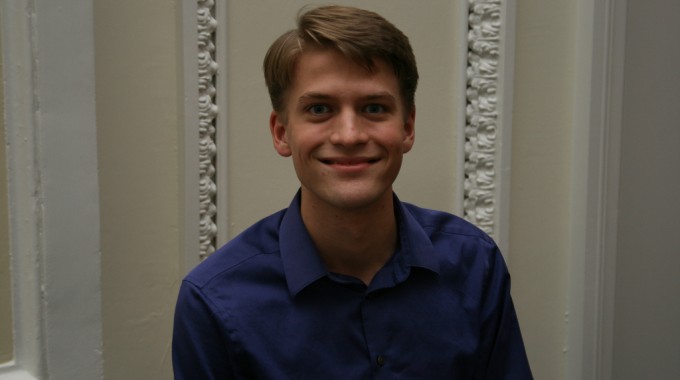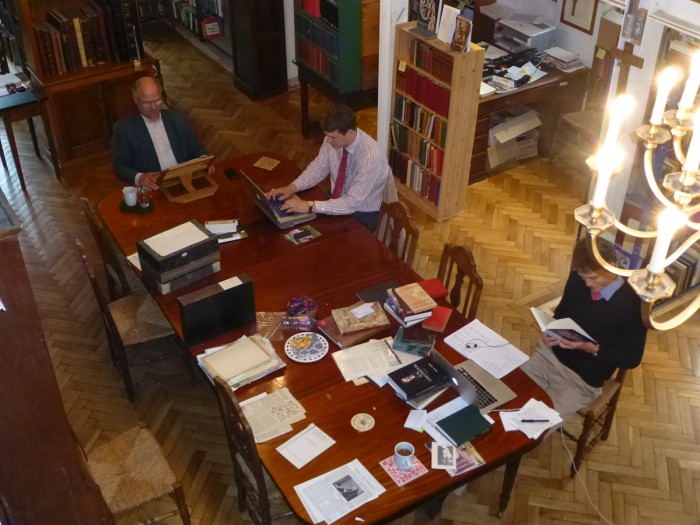If you know of a Columbia College student, faculty member, alumnus/alumna or program we should spotlight, or if you would like to submit a story, please contact:
Columbia College
Office of Communications
cc-comms@columbia.edu

"Getting to live in Oxford for the summer allowed me to ground everything I was learning and experiencing in tangible places." — Luke Foster CC’15
This summer, Luke Foster CC’15 received the Class of 1939 Summer Research Fellowship and the Richmond B. Williams Traveling Fellowship, and was accepted into the Center for Career Education’s Work Exemption Program (WEP), allowing him to spend the summer studying G.K. Chesterton’s work at the G.K. Chesterton Library in Oxford, England. Below, Foster shares his reflections on his experience abroad, and the poetic connections he was able to make between Chesterton’s life and the world around him.
As recently as mid-April, I didn’t have the foggiest idea where I’d be for the summer. Everything was up in the air, and I had no back-up plan.
My mad scheme for the summer came to me over Winter Break. At home for Christmas, I began to read G.K. Chesterton’s Ballad of the White Horse, and it fascinated me. Ideas from the Core Curriculum that I had been studying for two-and-a-half years brought the power of Chesterton’s poetry into sharp relief. The rollicking epic-ballad was clearly echoing Vergilian themes and repudiating a Hegelian/Marxist interpretation of history as the inevitable unfolding of a pre-existent dialectic. A thousand questions went off in my mind: Where did this strange work fit in literary history? Why choose the ballad genre to tell a tale of human hope and heroism against despair? What influence did Chesterton, writing in 1911, have on the younger generation of poets who succeeded him?
Those questions eventually brought me to the G.K. Chesterton Library in Oxford, England. Everything converged to bring me there for two months this summer: I contacted the Library, which offered to provide me housing because they were happy to have my assistance as an archivist while I conducted my own research; I was awarded both a Class of 1939 Summer Research Fellowship and the Richmond B. Williams Traveling Fellowship, which provided my airfare; and the Center for Career Education also supported my unique opportunity with a reduction in my summer earnings expectation through the Work Exemption Program (WEP).
The library is a two-story oval room, lined with bookshelves, tapestries, and busts. Father Jerome Bertram, Catholic priest, scholar, and full-time librarian, is its custodian. It holds a unique collection of Chesterton’s original manuscripts, personal effects, and — especially precious! — the two hundred books that remain of his own library. None of these resources has yet been digitized. Surrounded by Chesterton’s personal effects, I sought to divine the workings of his mind from staring at the books he once had on his shelves, and examining the notes and commentary he would scribble in them.
 Luke Foster CC’15 (far right) at the G.K. Chesterton Library in Oxford, England. Courtesy Luke Foster CC’15
Luke Foster CC’15 (far right) at the G.K. Chesterton Library in Oxford, England. Courtesy Luke Foster CC’15
I spent more than six weeks poring through manuscripts, original pamphlets and secondary criticism to produce an analysis of Chesterton as a nuanced and subtle poet who saw World War I as a symptom of a deeper spiritual crisis, and who pointed to the figure of Don Quixote as a symbol of needed spiritual renewal. I also gained incredibly valuable experience by sorting and preliminarily archiving the Library’s vast (and previously largely disorganized) collection. It was a daunting and humbling responsibility to have to make judgment calls about what material was valuable, what was redundant, and how best to arrange it for future scholars to use. The full-time librarian also taught me how to assess a document for its degrees of separation from Chesterton himself. A photograph of a 1990 Chesterton conference, for instance, was much less valuable than an original page from Chesterton’s boyhood notebook. And his wife, Frances Chesterton’s, complete diary for the year 1921 might be even more valuable.
I spent the last two weeks of my time at Oxford taking a course centered on the theme of “Faith and Culture,” organized by an Oxford-based think-tank and by Houston Baptist University. Specifically, the course traced the interplay between Christianity and English history, centering on the literature of the Catholic Revival period (which includes Chesterton and many of his associates). It was a wonderful way to tie my very specific and narrowly-focused research to overarching themes.
Getting to live in Oxford for the summer allowed me to ground everything I was learning and experiencing in tangible places, contextualizing Chesterton’s work within the broader crisis of British culture in the wake of the First World War. I visited G.K. and Frances Chesterton’s home in the little village of Beaconsfield. Even though it’s now a suburb of London, it is still dominated by its three pubs and two churches, and each modest brick house still hides behind a green hedge. I took the Eurostar train through the Channel Tunnel to Belgium and looked out over the battlefields of 1914 firsthand — scenes of hellish destruction now incongruously reduced to tilled farms. I knelt in prayer in Westminster Abbey, the spiritual center of English ceremony through the centuries, where the tombs of kings and poets surrounded me and where a thousand candles burned for a thousand prayers. I walked the streets of Oxford where Evelyn Waugh, the great nostalgic novelist, and John Henry Newman, the philosopher-theologian of towering intellect, had walked decades before. I saw the graves of so many of my literary heroes: Siegfried Sassoon, J.R.R. Tolkien, and C.S. Lewis. It was deeply humbling and inspiring, leading me to aspire to hone my craft as a writer, and to excel as a scholar.
Another special privilege of being in Oxford was having the chance to refine my plans for graduate study. After meeting and talking with several professors, who gave excellent advice, I now hope to pursue an MPhil in History at Oxford after graduation, examining the history of Victorian missionary efforts in higher education in relation to John Henry Newman’s The Idea of a University, the Victorian classic on liberal arts education.
I treasured every day of these summer adventures, and gained a deeper reverence for the perennial power of literature to shape culture. I look forward to bringing all that I learned back to Columbia to contribute my deepened perspective to the rich diversity of campus life through my Spectator column and my presidency of the Veritas Forum. My summer research will shape my thesis, and perhaps my scholarship for years to come. And I will continue to cherish the memory of my months in Merrie Old England!
Luke Foster CC’15 is a Columbia College senior majoring in English. He is the president of the Veritas Forum, a Columbia Daily Spectator columnist and a member of Columbia Faith and Action.
Do you have a story you’d like to submit? Email columbiacollege@columbia.edu.